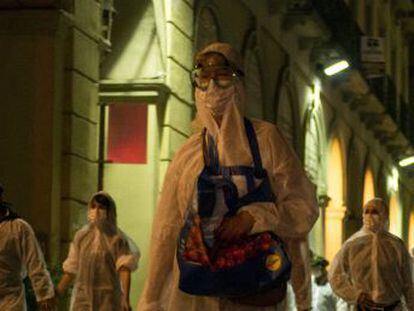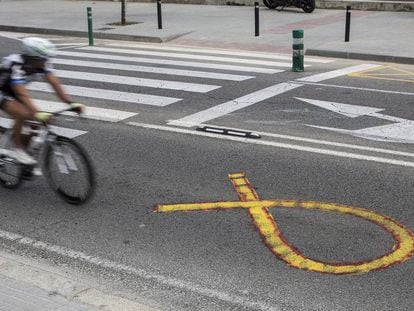Ciudadanos leaders remove yellow ribbons in Catalan town
Party chiefs Albert Rivera and Inés Arrimadas made the symbolic gesture in front of reporters on Wednesday in Alella (Barcelona), to jeers and whistles from local residents

Just hours after a group of around 80 people took to the streets of a Catalan town last night to remove yellow ribbons and other symbols that represent support for pro-independence politicians currently in pre-trial custody, two leaders of the center-right Ciudadanos (Citizens) party did the same in front of reporters.
The president of the national wing of the party, Albert Rivera, and the leader of the Catalan branch, Inés Arrimadas, removed yellow ribbons from a railing on a street in the town of Alella in Barcelona province.
The symbolic gesture of the two politicians, who were accompanied by a dozen or so supporters, was carried out without incident, although there were jeers and whistles from supporters of independence and a palpable atmosphere of tension.
While their supporters applauded them, the two politicians were subject to shouts of “Out!” “Shame!” and “Fascists!”
The group was accompanied by officers from the regional Catalan police, the Mossos d’Esquadra.
Minutes after the group had left, local residents tied more yellow ribbons on the same handrail.
Today’s gesture by the politicians comes in the midst of a campaign by Ciudadanos to lead the political response to the use of public space in Catalonia for the display of such symbols, with Rivera calling for public spaces to be a neutral place. In Alella this morning, Rivera denounced the “social fractures” in Catalonia, and called on the central and regional governments to guarantee the neutrality of public spaces in the region.
Ciudadanos was created in 2006 in response to the pro-independence movement in Catalonia, and expanded onto the national stage in 2014. The party won the most seats at the last regional elections in Catalonia, but fell short of an absolute majority, leaving pro-independence parties to form a government.
Arrest
Today also saw the arrest by the National Police of a man who is alleged to have broken the nose of a Russian woman during an altercation at the weekend over the yellow ribbons. The woman claims that she was assaulted by the man on Saturday after she began collecting up and throwing away the symbols. He, however, claims that his actions were not politically motivated, but rather because the woman was throwing the ribbons on the floor, “leaving the city dirty.”
Rivera today described the arrest as “good news” and expressed his hope that “justice would be done.”
What do the yellow ribbons symbolize?
A number of pro-independence leaders and Catalan politicians – including the former leader of the Catalan Republican Left (ERC) party, Oriol Junqueras – have been in custody since November while they await trial for their role in the independence drive in the region last year.
An illegal referendum on secession from Spain was held on October 1, and a unilateral declaration of independence was passed through the regional government at the end of that month. In response, the Spanish government used Article 155 of the Constitution to suspend the region's autonomous powers, and sacked the government.
Some of the politicians involved – including then-regional premier Carles Puigdemont – fled Spain to avoid arrest, while others were detained and denied bail, on the basis they might reoffend and that they presented a flight risk.
The yellow ribbons have since become a symbol of support for the release of these jailed politicians and former pro-independence association leaders Jordi Sànchez and Jordi Cuixart, but have proved to be a point of conflict between citizens who have opposing views on the issues in question. Tense scenes have been caught on camera on beaches in Catalonia, while just this weekend a woman allegedly had her nose broken by a man after an argument broke out when she removed some of the yellow ribbons.
English version by Simon Hunter.













































